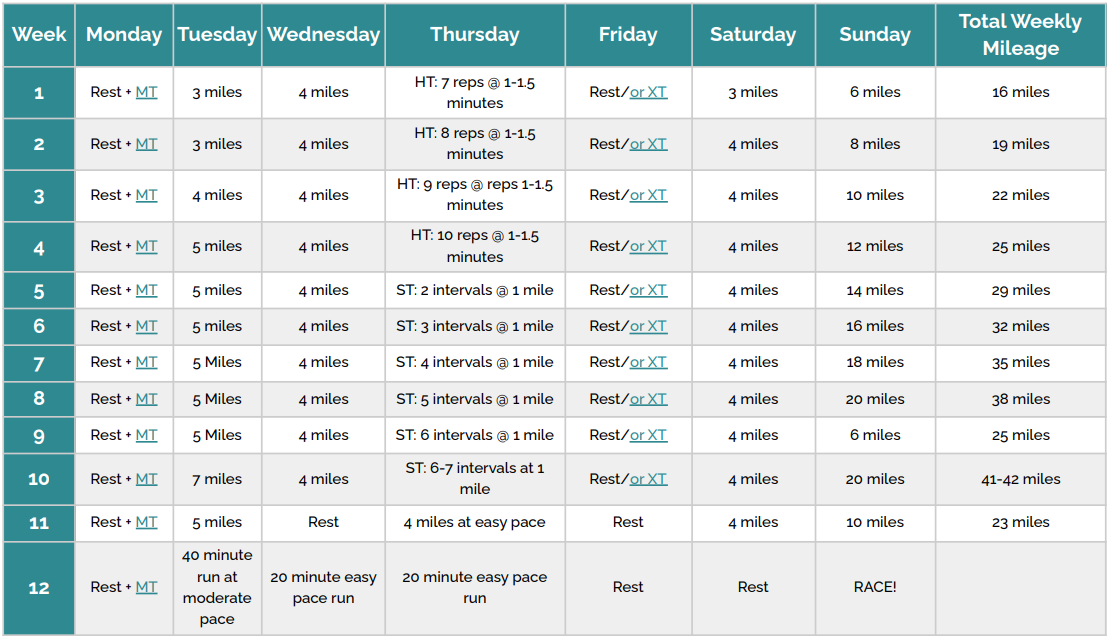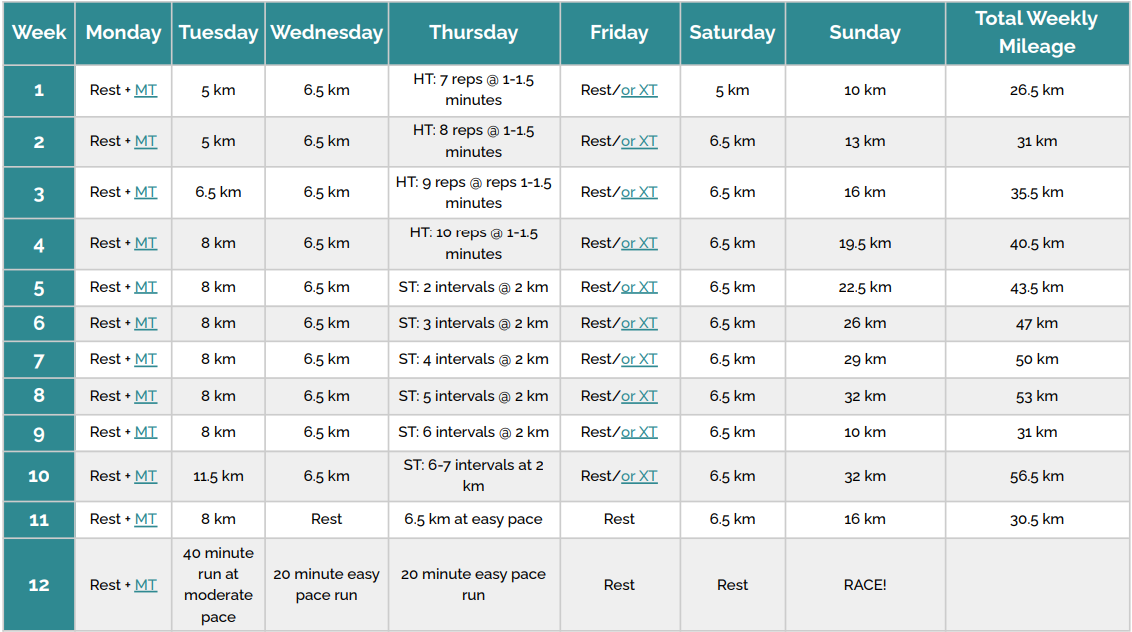12 Week Marathon Training Schedule
+ Free printable download
Last updated: February 6, 2026
Are you looking for a free 12 week marathon training schedule that also comes in a printable pdf format?
Do you want to include speed workouts and strength/hill training into your schedule?
Yes? Then I have the plan for you!
CAN YOU TRAIN FOR A MARATHON IN 12 WEEKS?
Absolutely!
Of course there will be factors that will make it easier for you to accomplish running a marathon in 3 months time.
This plan is the best fit for you to train for a marathon in 3 months if you:
- have previous running experience - Are you an experienced runner who has already previously run a marathon or are comfortable doing long endurance runs? (If this is your first marathon, more than likely you’ll need more time to prepare. I do have beginner plans. Check out my 16 Week Beginner Marathon Training Schedule or my 20-week plan to see if either of these fit you better! -And if you want a more advanced training plan, some time goal training plans are listed in this post.)
- can run at least 4 miles and preferably 6 miles, (or 6 to 10 kilometers) comfortably
- have the time - any form of marathon training is a huge time commitment
- you have answered these questions to determine if it's the right time for you to train for a marathon
- you want to have a faster build-up in your long run mileage days. (e.g. this plan takes you from a long run of 6 miles (10 kilometers) to a long run of 20 miles (32 kilometers) in just 12 weeks time)
Quick Look at this 12 Week Marathon Training Plan (miles version):
{This training plan comes in both miles and kilometers!}

Get the FREE printable pdf of this 12 week marathon training plan here!
12 Week Marathon training Plan (kilometers version)

ANATOMY OF the TRAINING WEEKS IN THIS 3 MONTH MARATHON TRAINING SCHEDULE
WEEKS 1-4: BASE BUILDING + STRENGTH PHASE
Your marathon training Goal During Weeks 1-4:
You have two main goals during the first four weeks of this 12 week marathon training schedule:
- Build your running base in order to handle the future weeks of increased weekly mileage and higher mileage long runs.
- Strengthen your muscles through hill workouts to get you ready for speed workouts that will be coming in the following weeks.
Building your running base during the first four weeks:
It's important to be able to run at least 4 - 6 miles (or 6 to 10 kilometers) comfortably before you begin this training plan because as with anything you do, you want to start where you are already at and build from there.
Since your first scheduled long run is 6 miles (10 kilometers) during Week 1, it is best that you are able to run about 6 miles although you would probably be fine coming in at 4-5 miles if you are comfortable with running those distances.
Your long run mileage progresses rapidly and if you are not comfortable already with running 4-6 miles (6 to 7 kilometers) you might find yourself struggling to keep up with the plan.
If you don't feel ready to do the first week of training in this program, pause, keep building a good running base and then come back and start this program.

Your total weekly mileage during weeks 1-4
Over the first 4 weeks of this marathon training schedule you will increase your weekly mileage from 16 miles in Week 1 to 25 miles in Week 4.
Here is the exact breakdown of your weekly mileage:
Week 1: 16 miles (26 kilometers)
Week 2: 19 miles (31 kilometers)
Week 3: 22 miles (35 kilometers)
Week 4: 25 miles (40 kilometers)

The workouts scheduled during weeks 1-4
- The majority of your workouts in Weeks 1-4 will be short, base runs.
- You will have long runs progressing from 6 miles up to 12 miles. (or 10 to approximately 20 kilometers)
- You will be performing hill intervals - see this page for information on hill training - on Thursdays, increasing your hill reps each week from 7 to 10 repetitions. This will allow you to gain strength and stamina and set you up for your speed training that will occur during weeks 5-10.
WEEKS 5-10: INCREASING ENDURANCE + SPEED TRAINING PHASE
Your Goal during weeks 5-10:
- Continue to build your endurance through your weekly base training runs and your long run on the weekend.
- Build speed through interval workouts
Weeks 5-10 are the most important weeks of your training as you will be doing some crucial long runs that will set the tone for your marathon race success!

Your total weekly mileage breakdown for weeks 5-10:
Over the course of weeks 5-10 of this marathon training schedule, you will increase your weekly mileage from 29 miles in Week 5 all the way up to 42 miles.
Here is the exact breakdown of your weekly mileage:
Week 5: 29 miles (43.5 kilometers)
Week 6: 32 miles (47 kilometers)
Week 7: 35 miles (50 kilometers)
Week 8: 38 miles (53 kilometers)
Week 9: 25 miles (reduction week to allow for more recovery after last weeks 20 miler and to get your body ready for another long run of 20 miles in the follow week). (31 kilometers)
Week 10: 41-42 miles (56.5 kilometers)

Your training workouts during weeks 5-10
- The majority of your runs will continue to be base runs.
- You will complete a long run each weekend which will include two 20 mile long runs (32 kilometers) before you reach the starting line of the marathon (during weeks 8 and 10).
- You will also be adding in interval workouts (guidelines for interval training here) - on Thursdays, in place of your strengthening hill repeat workouts that you did during the first 4 weeks of this marathon training schedule.
WEEKS 11-12: TAPERING + CARBO-LOADING
Your Goal during weeks 11-12:
- Reduce your mileage and add in a bit more extra rest and recovery before your big day. This is also known as tapering! Here is the science and more information behind the idea of tapering.
- Heavily focus on getting your body nutritionally ready to run a marathon (mainly through implementing some sort of carbo-loading plan. You can find out more on how to carbo-load here.

Your weekly mileage during weeks 11-12:
As you will be tapering during these final 2 weeks of your training plan your weekly mileage will be lower. You are coming in towards the finish line!
Week 11: 23 miles (30.5 kilometers)
Week 12: At least 26.2 miles! :) Your runs this week are time based so that you can focus on your pace and time spent running versus mileage.
Your Training Workouts during weeks 11-12:
- Again, the majority of your runs will be base runs.
- Your long run during Week 11 is cut in half from the previous week as we are in our taper phase.
- There are no hill or speed workouts scheduled as we are focusing on more moderate paced runs leading into your marathon race day!
Resources for you to used to nail the final 2 weeks of your marathon training schedule:
Here is also a sample carbo-loading menu + prep plan that will give you an idea of what your carbo-loading meals can look like.
If you want a personal carbo-loading plan, race-refuel plan, and personal recovery plan (+ so much more all personalized to YOU), then your ultimate resource is the EAT LIKE A MARATHONER Nutrition Kit.
You will want to complete the included 9 Step Marathon Nutrition Prep plan in EAT LIKE A MARATHONER Nutrition Kit at least 2 weeks before your race day which would be at the beginning of Week 11 of this marathon training schedule.
ANATOMY OF THE WEEKLY DAYS IN THIS MARATHON TRAINING SCHEDULE:
Mondays:
These are your rest days following your long run on Sunday.
Take these days seriously. It is good to include some active rest and recovery techniques such as doing a foam rolling session, taking a nap, etc.
Here is a 24 Hour Long Run Recovery Timeline of how you might want to handle those hours after a long run so that you can recovery quickly and move strongly into your next training week.

Tuesdays:
Tempo runs are scheduled for Tuesdays. These runs help to improve your endurance and your ability to handle stress.
Run these training runs at 80% of your VO2max or about 80% of your max heart rate.
For information on how to complete a tempo training run review this page.

Wednesdays:
Easy, short, base runs are scheduled on Wednesdays.
These are more maintenance, volume building runs that help to add to your weekly mileage, keep your running fitness level and help you to keep injury at bay as you lead into your long run on the weekends.
Try to focus on your form and breathing during these easier runs.
Run them at 70% of your VO2max or about 70% of your max heart rate.

thursdays (During weeks 1-4):
These are your quality workout days.
During Weeks 1-4 you will focus more on strengthening your leg muscles through scheduled hill repeat workouts.
You want these reps/intervals to be performed at about 97-99% of your VO2max pace or about 95% of your max HR.
Your hill workouts are designated by “HT” on the training schedule. They are scheduled on your plan in this form: HR: 7 reps @ 1-1.5 minutes.
Read this as, “7 hill repetitions at 1-1.5 minutes per each repetition”. This means that you will be running a total of 7 repetitions up the hill for your HT and you will try to run for at least 1-1.5 minutes for each repetition.
For all the information on performing hill repeat workouts see this page.

thursdays (During weeks 5-10):
During the second part of this marathon training schedule you will trade in your hill strength workouts for speed workouts.
Your speed workouts during this speed training block will be in the form of interval workouts.
Your speed training sessions are marked in this form on your training schedule:
"ST: 2 intervals @ 1 mile".
Read this as "Perform 2 one mile intervals."
This would mean you would be running a total of 2 miles at your interval pace but you will be resting between each interval.
Here are the guidelines on running interval workouts.
fridays:
These are scheduled rest days or you could choose to do an optional cross training day.
Take the rest day if you are feeling worn down otherwise a little cross training may do your body good.
When you are training for a marathon in 12 weeks time though, its more important to focus on your runs and your rest and so it can be beneficial to ignore cross training altogether especially if you are feeling tired or overwhelmed.
Cross-training is marked as XT on the schedule.
Here’s a list of cross-training activities that I recommend for runners and some to avoid while training.

Saturdays:
These are another easy, short, base run training days that provide more maintenance/ volume building runs.
Try to focus on your form and breathing during these easier runs.
You don't need to focus on your pace during these runs but if you want to keep them it in check, run them at 70% of your VO2max or about 70% of your max heart rate.
sundays:
Your Long Run days are here!
There are many different ways and training styles to run your long runs based on the goals that you might have.
If you aren't training for a time goal then I would suggest running at about 60-70% of your VO2max or heart rate.
The purpose would be NOT to go fast but to target your aerobic system, increase your heart strength, and ultimately increase your endurance.
In fact, it's good to run these longer runs at about 1-3 minutes slower than your normal running pace.
If you are training for a time goal then I would highly recommend reading this page on the 3 different types of long runs that marathoners can do to nail their marathon goal race pace.
You will learn about goal paced long runs and progressive long runs that help you practice your race pace during your long run on that page.
Get the free printable pdf of the miles and kilometers version of the 12 week training schedule 👇
{This training plan comes in both miles and kilometers!}
If you want a bit more guidance along the way, you will enjoy having the 12 Week Marathon Training PLUS plan which comes with:
- Daily Motivational Boosters
- A 12 Week Mindset Training Plan
- A 6 Week Marathon Meal Plan - that can be rotated through 2x for a total of 12 weeks. The meals are based off of the training schedules workouts for the that day!
- Check it out below! 👇
Get the 12 Week Marathon Training PLUS PLAN here 👇

Here are some more resources on the long run that you might be interested in:
Your Guide to Running Your Best Long Distance Runs
What is the Best Pace to Run During Your Long Run
How to Recover Quickly After a Long Run
Pages related to the 12 week marathon training schedule:
As featured on:










New! Comments
Have your say about what you just read! Leave me a comment in the box below.